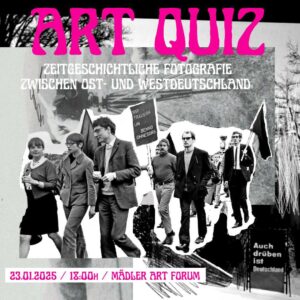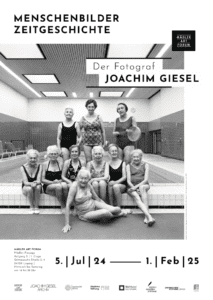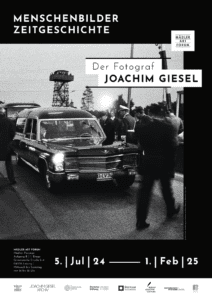On Wednesday, May 13 at 7 p.m., the exhibition on Joachim Giesel will open at the Galerie für Fotografie in Hanover. The exhibition will be on display from May 14 to June 14.
More information will follow at: https://www.gafeisfabrik.de/Galerie/
On Wednesday, May 13 at 7 p.m., the exhibition on Joachim Giesel will open at the Galerie für Fotografie in Hanover. The exhibition will be on display from May 14 to June 14.
More information will follow at: https://www.gafeisfabrik.de/Galerie/
On February 1, we closed the doors of our exhibition “MENSCHENBILDER | ZEITGESCHICHTE. The photographer Joachim Giesel” at the MÄDLER ART FORUM.
A total of 4,042 interested guests visited us on 123 open exhibition days in 31 weeks! That was an average of 33 visitors per exhibition day in 4 hours. We have therefore broken the visitor record!
It was a great pleasure to experience numerous guided tours, lively discussions and talks, as well as an exciting supporting program including midissage, finissage, an art quiz and an inspiring artist talk with Joachim Giesel.
Special thanks go to the entire exhibition team, our professor, the staff of the MÄDLER ART FORUM, especially the director Carolin Niederalt and the Mädler Passage for their support and commitment!
We look forward to seeing you again!
The photographer Joachim Giesel – Episode 2
In this episode we present an exclusive insight into the artist talk, which took place on November 7, 2024 in the exhibition “MENSCHENBILDER | ZEITGESCHICHTE. The photographer Joachim Giesel” took place.
Marietta Mann, the exhibition assistant, led the artist talk with Joachim Giesel, in which the photographer gave insights into his biography and his artistic practice.
As part of the exhibition “MENSCHENBILDER│ZEITGESCHICHTE. Der Fotograf Joachim Giesel” at the MÄDLER ART FORUM in Leipzig, the ART QUIZ Kollektiv will dedicate its latest edition on January 23, 2025 at 6 pm to the topic of contemporary photography between East and West Germany. Against the backdrop of the extensive presentation of the work of Hanoverian photographer Joachim Giesel, ART QUIZ takes a look at artistic positions from West and East Germany with a focus on social photography. In this way, ART QUIZ takes a playful approach to contemporary historical documentation and socio-political themes between West and East Germany. The focus is on the perspectives of photographers as observers of social discourse. In cooperation with the Joachim Giesel Archive and the MÄDLER ART FORUM, the ART QUIZ invites all interested parties to puzzle, exchange and learn. And of course there are prizes for the winners!
January 23, 2025 at 6:00 pm
MÄDLER ART FORUM Leipzig in the Mädler Passage: Grimmaische Straße 2-4, Entrance B, 1st floor
Admission free of charge

Joachim Giesel, Trauermarsch Benno Ohnesorg, Hannover, 9. Juli 1967.
Joachim Giesel, Grenze bei Lübeck (aus der Dokumentation Grenzland–Niemandsland), Lübeck in Schleswig-Holstein, 1984.
Arbeitsfotos Joachim Giesel, in: Niedersächsischer Staats- und Förderpreis, Hannover, 1985. (Joachim Giesel Archiv)
The photographer Joachim Giesel – Episode 1
In this episode, we delve into the life and work of an extraordinary photographer. We explain Joachim Giesel’s career as a photojournalist, freelance author and commercial advertising photographer based on various stages of his very wide-ranging artistic work.
Lea Weiß provides insights into the exhibition ‘MENSCHENBILDER | ZEITGESCHICHTE. The photographer Joachim Giesel’, which was developed as part of a seminar at Leipzig University based on a concept by Rickie Lynne Giesel (Joachim Giesel Archive) and Prof Martin Schieder (Institute of Art History).
Sara-Marie Plekat from MONOPOL Magazine has written about our exhibition ‘Menschenbilder | Zeitgeschichte. Der Fotograf Joachim Giesel’. You can find the article here.
Until 5 January 2025, the Stadtmuseum Düsseldorf is hosting the exhibition ‘Das ist Gesellschaft. Soziale Fotografie in Düsseldorf’. At the centre of the exhibition is the eponymous question ‘What is society?’. If you were to ask a wide variety of people on the street, you would get just as many different answers. For some it is where they live, for others it is their fellow human beings. It is a simple yet profound and social question. Joachim Giesel is exhibited here together with Christian Borchert, Candida Höfer and Tata Ronkholz, among others.
More information here.

Memories of the history of the Museum für Photographie Braunschweig and its exhibitions
To mark the museum’s 40th anniversary, the Museum für Photographie Braunschweig looks back on its exhibition history in a selection of important photographic works and photographic positions.
In addition to the images with a documentary visual language shown primarily in the 1980s and 1990s, various conceptual artistic approaches developed over the course of the following decades, in which staging or media-immanent references or installations were at the forefront of the themes. The exhibition will also take a look at photographic image possibilities using the example of Boris Eldagsen’s AI-based generative photography.
The two classicist museum gatehouses will be integrated into the presentation and the rooms will be designed with references to the history of the building.
Laurenz Berges | Anna und Bernhard Blume | Natalie Czech | Boris Eldagsen | Walker Evans | Gisèle Freund | Albrecht Fuchs | André Gelpke | Joachim Giesel | Vadim Gushchin | Jitka Hanzlová | Erik Kessels | Chris Killip | Alwin Lay | Robert Lebeck | Natacha Lesueur | Ute Mahler | Gordon Parks | Albert Renger-Patzsch | Heinrich Riebesehl | Sebastião Salgado |August Sander | Iris R. Selke | Esther Shalev-Gerz | Malick Sidibé | Ingo Taubhorn | Susa Templin | Weegee | Miron Zownir | Wolfgang Zurborn
For further information see https://www.photomuseum.de/erinnerungsbilder/
Exhibition concept: Rickie Lynne Giesel (Joachim Giesel Archive) and Prof. Martin Schieder (University of Leipzig) in collaboration with students from the Institute of Institute for Art History at the University of Leipzig
For over fifty years, the Hanoverian photojournalist, freelance author and commercial advertising photographer Joachim Giesel (b. 1940 in Breslau) has been capturing the political, social, economic and cultural development of the Federal Republic of Germany in his documentaries, series, portraits and advertising photographs. In its historical caesuras and social transformations. In its prosperity and its stuffiness. In its beauty and diversity. And people are always at the center of it all. Giesel accompanied Queen Elizabeth II on her visit to Hanover in 1965, mingled with the mourners at the funeral of Benno Ohnesorg in 1967, attended the legendary football match between the GDR and Brazil in 1974, created a gallery of chancellors from Konrad Adenauer to Helmut Kohl, photographed a series of mentally ill people, staged captivating portraits of Franz Beckenbauer to Udo Jürgens, from Max Frisch to Doris Dörrie, from Louis Armstrong to Rudolf Augstein. In the tradition of August Sander, his photographs give us fascinating insights into West German society across the generations, between prefabricated housing estates and detached houses, between assembly line workers and drag queens, between Swan Lake and nudism. They are thus contemporary documents of German history. By searching for the “picture behind the picture”, Giesel’s images of people fascinate viewers with their aesthetic diversity, technical brilliance and unmistakable presence, making the photographer an important figure in the history of German photography after 1945.
Exhibition venue: MÄDLER ART FORUM Leipzig
Vernissage: Thursday, 4 July 2024 at 18:00
Duration: 5 July 2024 until 1 February 2025
Opening hours: Wednesday to Saturday Wednesday to Saturday, 14:00-18:00
Guided tours: Every Saturday at 15:00
Entry free!
Further information at: https://maedlerartforum.com/2024/06/11/demnaechst-menschenbilder-zeitgeschichte/


From 31 May to 16 June 2024, curator Pauline Tigges showed ten selected works from the “Verrückt nach Ilten” series at the Joachim Giesel Archive at Cichoriusstraße 2 in Leipzig as part of the f/stop-festival. Rickie Giesel, Pauline Tigges and the artist Joachim Giesel spoke at the opening. The radio station mephisto 97.6 was also on site and reported on our exhibition. Listen here.